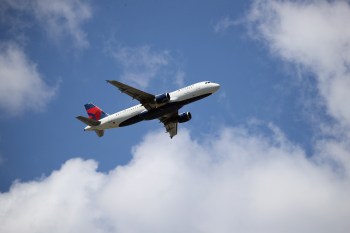Another big delay for Airbus
Share Now on:
Another big delay for Airbus
KAI RYSSDAL: The official name is the Airbus A380. It’ll be the biggest commercial airplane in the skies. Once it finally gets out to airlines. Parent company EADS announced a second big delay in delivery today. Another year. That’ll make the A380 a full two years late once it finally gets in service. And it’s dragging the rest of the company along behind it. Doug Cameron covers airlines for the Financial Times. Mr. Cameron, is this airplane ever going to make it?
CAMERON: I don’t doubt that they will get it done. They mentioned in the investor call today that the problems that they’ve had they identified with the wiring are the primary problem. There are no underlying faults with the integrity of the plane. So, they will get it. They will deliver it. But it’s going to be late and it’s going to cost them a lot of money.
RYSSDAL: what happened to Airbus? It seems just six months, eight months, a year ago they were neck and neck with Boeing. And now it’s quite different.
CAMERON: There’s certainly been a remarkable turnaround. But not only were they neck and neck with Boeing, they’d actually overtaken them over the last three or four years and had been outselling them in the marketplace. Boeing suffered similar setbacks about eight years ago, actually had to close down production lines for about a month while it sorted out problems. What’s happened is that Airbus has suffered a number of production and management difficulties and Boeing’s got better at the same time.
RYSSDAL: The way I read the wires today, Emirates Airlines, the first airline that was supposed to get this airplane up in the air and flying is, and the quote is “reviewing all its options.” That can’t possibly be a good thing.
CAMERON: These customers who are going to get aircraft late, they’re going to be looking for penalties and compensation. So, there’s certainly a bit of bargaining going on. What you are seeing from the customers is certainly a lot of posturing. But for someone like Emirates, they’ve ordered 40 planes, they’ve built a shiny new terminal in Dubai to handle this huge aircraft. They have a lot riding on it.
RYSSDAL: Is Airbus still playing catch-up with Boeing in some of its other lines? The follow-on to the Dreamliner for Boeing and then Airbus’ answer to the 737, the A320?
CAMERON: The A320 has outsold the 737 over a number of years and has been the mainstay of Airbus’ emergence as Boeing’s primary competitor — and, indeed, overtaking it in many markets. The problem with Airbus is it’s taken a huge bet on the A380 and has been distracted from other programs.
RYSSDAL: And, in fact, I think I read today they’re going to lose $6 billion now on this airplane.
CAMERON: $6 billion is actually a bit of a misnomer. What they’re going to do is probably take a $6 billion hit in terms of lost sales, compensation and restructuring charges — not just because of A380 but because of the other problems this whole fiasco has revealed.
RYSSDAL: Do you think Airbus was a bit grand in this idea of the A380?
CAMERON: Airbus actually worked with Boeing on the whole concept of a very large aircraft for some time. And then Boeing decided to go it alone with a smaller and cheaper aircraft. The world has changed since Sept. 11 and that is more what airlines want. They want the smaller and cheaper. Boeing has had a huge resurgence. A big turnaround for Boeing. And Airbus has lost ground in terms of that key middle aircraft market.
They weren’t grandiose in their plans, but they may have made the wrong bet.
RYSSDAL: Doug Cameron covers airlines out of Chicago for the Financial Times. Mr. Cameron, thanks a lot.
CAMERON: Thank you.
There’s a lot happening in the world. Through it all, Marketplace is here for you.
You rely on Marketplace to break down the world’s events and tell you how it affects you in a fact-based, approachable way. We rely on your financial support to keep making that possible.
Your donation today powers the independent journalism that you rely on. For just $5/month, you can help sustain Marketplace so we can keep reporting on the things that matter to you.


















